— April 18, 2019
Rank checking is one of the most important and essential SEO activities, that’s for sure. And although there’s a point of view that rank checkers are useless due to the fact that search engines have become smarter (search history, location, device type, and even social signals are all taken into consideration), modern rank checkers do get smarter as well.
With a powerful rank tracking tool by your side, you can get a firm understanding of where you stand with your rankings, who your competitors are, and what pages of yours need improvement.
I won’t lie saying that there’s a vast variety of rank checkers to choose from these days. So it can be really tough to pick just one, especially for those who are making their first SEO steps. However, there’s a set of characteristics you can judge rank checkers by, and these are:
1. The number of keywords to check positions for
Naturally, depending on different industries and site sizes, website owners need to check positions for a different number of keywords. Therefore, you need to make sure that the number of keywords a rank checker can track positions for meets your needs.
2. The frequency of ranking checks
For some industries, organic search can be very competitive and fast-changing – to stay afloat, you need to see the freshest ranking data possible. That’s why it’s important that the rank tracker of your choice doesn’t limit the frequency of ranking checks or at least allows daily checks.
3. Keyword analysis metrics
By having extensive keyword data at your fingertips, you’ll be able to better analyze your keywords as well as understand why certain keywords perform better than others. These insights can help you understand what keywords are worth targeting and creating content around.
4. Cost-effectiveness
Of course, the plan and feature set should satisfy your website needs, marketing objectives, and budget.
5. Usability and support
For SEO newbies choosing their first ever rank checkers, it’s dead important the software’s interface is simple and intuitive. And surely, it’s always good when the software of your choice provides customer support to have your back in case you face difficulty.
To help you make the best choice, here’s a list of 10 excellent rank checking tools with their strengths and weaknesses analyzed and pricing compared.
1. Rank Tracker (by SEO PowerSuite)
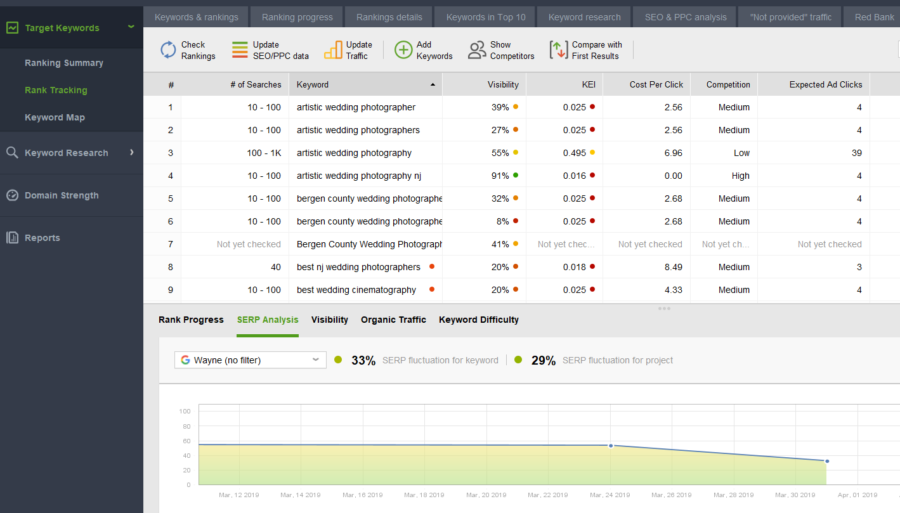
Rank Tracker is a piece of extremely powerful software that eases the job 10 times with everything when it comes to tracking rankings. With this tool in your arsenal, you can check rankings in Google, Yahoo, Bing, YouTube, and more than 300 other search engines and their variations.
With the help of the Ranking Keywords feature, you can now extract a list of keywords a site is currently ranking for – you can analyze either your own website or any of your competitors’.
For those who want to check geo-specific rankings, there’s an opportunity to track positions for any custom location, be it a country, state, city, or even street address.
The best thing about the tool is that it doesn’t limit anything – the number of keywords to track, domains to analyze, projects to create. What’s more, you can update your rankings however often you want to or make the tool do it for you – just pick the time and frequency of the checks.
The tool is integrated with Google Analytics and Google Search Console, so every keyword you check positions for will be accompanied by the number of searches, traffic sources, cost per click, and a bunch of other useful SEO indicators. You can also see the exact keywords that bring out SERP features as well as SERP features occupied by your competitors.
On top of that, with Rank Tracker on your side, you can clearly see how your rankings change over time and compare ranking results by date or with the best/worst results. With the help of Rank Tracker’s competitor tracking feature, you can track rankings of your top 10 competitors’ positions and record their ranking history.
Other than that, the tool lets you generate fully customizable keyword rankings reports – you can choose the data that you want in your report, brand it with a logo, and pick a color scheme to your liking.
On the dark side, some users may find Rank Tracker a bit inconvenient due to the fact that it’s desktop software. But on the other hand, this allows the tool to collect a much bigger amount of data and makes it significantly cheaper compared to other rank checkers on the market.
Pros
- Unlimited keywords to check rankings for
- Unlimited domains to analyze
- An ability to check rankings with any frequency
- Comprehensive keyword data
- Google Search Console and Google Analytics integration
- Unlimited free trial
- Customer support
Cons
- The software’s interface may seem a bit tricky at first
- Desktop software
Pricing
The price of the software consists of a one-time license fee ($ 124.75 or $ 299.75 depending on the plan) and a minor maintenance fee, starting from $ 4 per month.
A free edition is available for download here.
Learn more about Rank Tracker’s pricing and plans.
2. Google Search Console
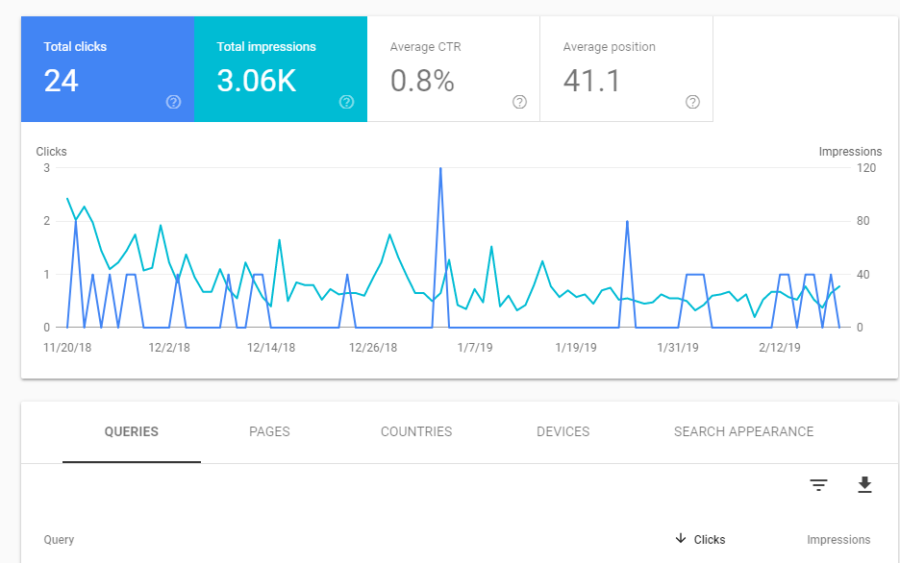
The second tool on our list is the old but gold Google Search Console – an excellent source of keyword data straight from Google. It shows what keywords your webpages have been ranking for and what positions they’ve occupied within the last 28 days. Basically, the tool supplies you with a list of pages of yours that received the most clicks from Google, search queries that caused them, and analytical data – impressions, CTR, and average position. By the way, all these stats can be filtered by date, page, or device for your convenience.
The thing with Google Search Console is that it rounds off the stats it displays. So it’s better to use it in combo with another rank checker or go for a rank tracking tool that already has Google Search Console integrated.
On the bright side, Google Search Console is perfect for those who have just started SEO and are not ready to invest in a more professional rank tracker.
Pros
- 100% free of charge
- Google’s own tool
- New user-friendly interface
Cons
- Data can be inaccurate
- Discrepancies between Google Analytics and Search Console data may occur
- No customer support
- May not suit experienced SEOs
Pricing
Free
3. Rank Tracker (by Moz Pro)

Moz’s Rank Tracker is another tool that does a great job tracking ranking performance. The tool supplies you with precise rankings and keyword data and lets you set up rank tracking to check positions from a specific location.
The tool is also irreplaceable when it comes to tracking your ranking progress, your competitors` performance as well as changes occurring in SERPs. You can also keep a tab on your competitors by spying on their rankings, comparing them to yours, and finding opportunities for improvement.
The thing that is not so great about Moz Pro is that it has a lot of limitations – the number of keywords you’re able to track, rank checking frequency, and users. So, although Moz has pretty much everything you need for basic rank checking, the tool would rather suit beginner SEOs. The interface is very intuitive and simple.
Pros
- Perfect for newbies
- Free 30-day trial
- Great learning materials
- Customer support
Cons
- Weekly rank checks
- Limited keywords to track
- Limited users
- May not suit experienced SEOs
Pricing
The software’s pricing starts at $ 99/mo and ends at $ 999/mo, depending on a plan.
A free trial is available.
Learn more about Moz’s pricing and plans.
4. SEMrush
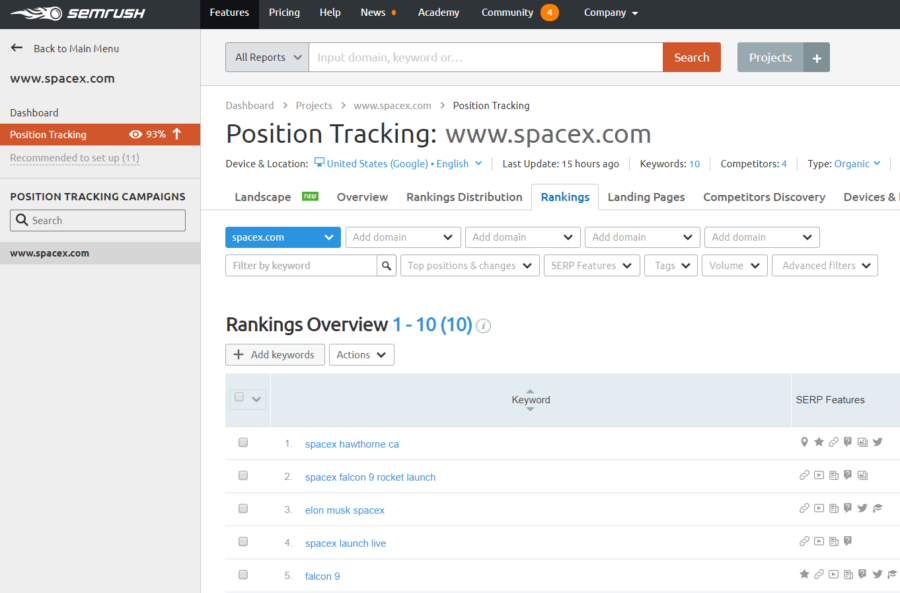
SEMrush is a piece of all-in-one SEO software that also includes a great rank tracking tool with one of the largest keyword databases in the industry.
The thing a lot of SEOs (myself included) love about the software is its accurate ranking data and granular tracking – the ability to segment rankings by geographical positions, devices, and search engines. On top of that, with the help of SEMrush’ SERP Sensor tool, you can see the SERPs’ volatility within the last 30 days.
The tool also comes in very handy for competition research – it allows you to compare your rankings with up to 20 competitors to see how you stack up against your competition.
As you know, keywords that have SERP features (featured snippets, image packs, knowledge graphs) are on priority lists of any SEO. So the great thing about SEMrush is that it allows you to map keywords to SERP features.
However, the thing some SEOs and website owners may dislike about the tool is that SEMrush limits keywords, projects, and users.
Pros
- Daily rank checks
- Google Analytics and Search Console integration
- Comprehensive keyword data
- An ability to map keywords to SERP features
- Free 30-day trial
- Customer support
Cons
- Limited keywords to check rankings for
- Limited projects to create
Pricing
The software’s pricing starts at $ 99.95/mo and doesn’t have a limit, as the price of the Enterprise plan depends on how many keyword you’re willing to track.
A free trial is available.
Learn more about SEMrush’s pricing and plans
5. Ahrefs
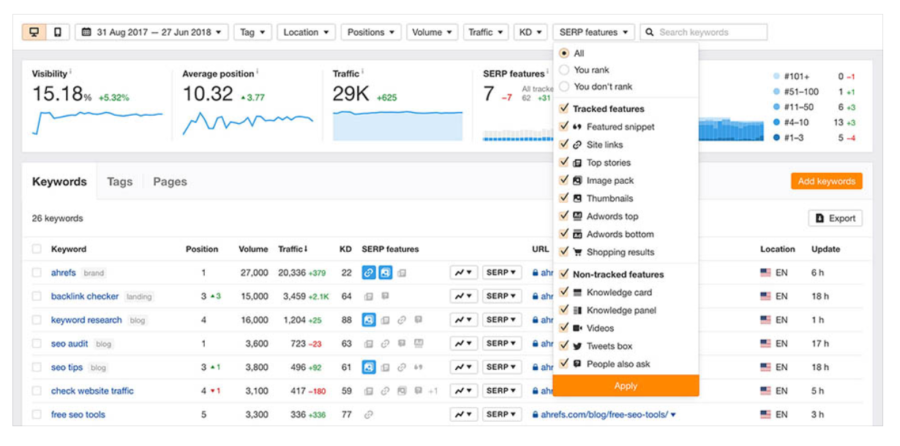 Ahrefs is yet another magnificent piece of software that has definitely proved to be one of the most reliable rank checkers in the industry.
Ahrefs is yet another magnificent piece of software that has definitely proved to be one of the most reliable rank checkers in the industry.
Armed with this rank tracking tool, you can track Google rankings across 170 countries. All the keywords that you track within your project will be accompanied with search visibility, average position and traffic, and position distribution metrics.
The tool also lets you explore your competition in-depth by comparing your rankings with those of your top 5 competitors, reporting on their ranking progress, search traffic, and SERP features.
Just like SEMrush, Ahrefs allows mapping keywords to SERP features. But it can alert you when any of your keywords have won or lost a SERP feature. These insights can help you to prioritize content optimization of certain pages to ensure you keep hold of the SERP feature.
Speaking of the downsides, the tool limits the number of keywords you can track as well as the frequency of rank checks. For instance, if you go for the Lite plan, you will only be able to track 500 keywords. Additionally, some plans limit the number of locations to check rankings from – this can be inconvenient for those who run large businesses.
Pros
- Google Analytics and Search Console integration
- Comprehensive keyword data
- An ability to map keywords to SERP features
- Customer support
Cons
- Limited keywords to check rankings for
- Limited projects to create
- Limited rank checking frequency
- No free trial
Pricing
The pricing starts at $ 99/mo and ends at $ 999/mo, depending on a plan.
A 7-day trial is available for $ 7.
Learn more about Ahrefs’ pricing and plans.
6. Advanced Web Ranking
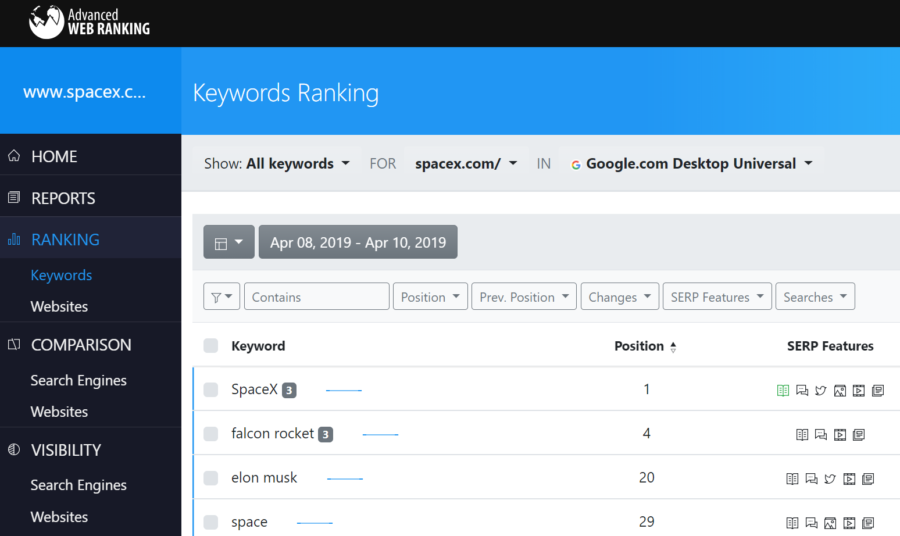
Advanced Web Ranking is a powerful tool that can boast of a wealth of different features, including rank checking. It shows accurate rankings in more than 130 countries and 22 search engines. For those who do local SEO, the tool also allows tracking location-specific rankings mapped to zip code level.
Every keyword tracked will be accompanied by exhaustive keyword data fetched from Google Search Console and Google Analytics. What’s more, the tool allows you to compare your ranking performance to your competitors’, and it also tracks and records SERP features.
Speaking of the frequency of ranking checks, the tool updates rankings on a daily basis, ensuring you get the freshest data possible. However, Advanced Web Ranking does limit the number of keywords you can track to 35,500.
Pros
- Daily rank checks
- Google Search Console and Google Analytics integration
- Comprehensive keyword data
- Free 30-day trial
- Customer support
Cons
- Limited keywords to track
- The software may not suit beginners
Pricing
The price of the software starts at $ 49/mo and ends at $ 499/mo, depending on the plan.
A free trial is available.
Learn more about Advanced Web Rankings’ pricing and plans.
7. AccuRanker
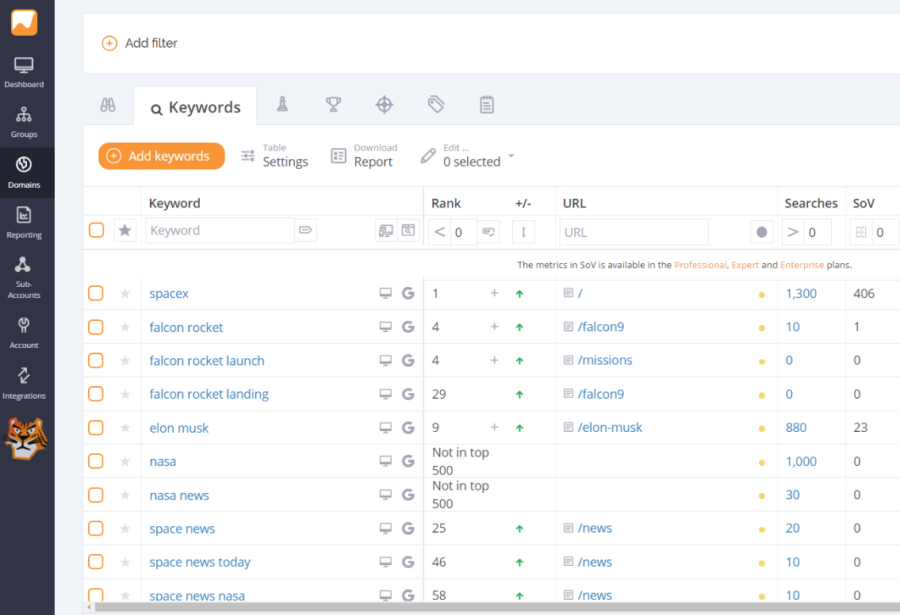
AccuRanker is a mighty rank checker that allows you to track positions for up to 100,000 keywords. Due to the tool’s Google Search Console and Google Analytics integration, you’ll receive comprehensive and insightful data for every keyword – the number of searches, share of voice, CPC, potential traffic, estimated visits, and SERP features. AccuRanker also lets you compare your keyword rankings to your top-10 competitors.
The great thing about the tool is that it updates your rankings on a daily basis, and if you want even fresher data, you can manually refresh your keywords – so you can always see the freshest data. What’s more, AccuRanker doesn’t limit the number of domains you want to track as well as the number of users you can give access to your account to.
Another thing that I’m sure beginner SEOs will appreciate a lot is the software’s user-friendly interface and the fact that a lot of data is presented in a visual way.
Unlike Moz Pro, SEMrush, and Ahrefs, AccuRanker is a tool that specializes in rank checking only, but cost is almost the same. So if you’re looking for all-in-one SEO solution with a rank tracker included, those three are a lot more cost-effective.
Pros
- Daily rank checks
- Google Search Console and Google Analytics integration
- In-depth keyword data
- Unlimited domains
- Unlimited users
- User-friendly interface
- 15-day free trial
- Customer support
Cons
- Limited keywords to track
- Price
Pricing
The software’s pricing depends on the number of keywords you need to track. It starts from $ 49/mo for 500 keywords and ends at $ 2,499/mo for 100,000 keywords.
A free trial is available.
Learn more about AccuRanker pricing and plans.
8. AuthorityLabs
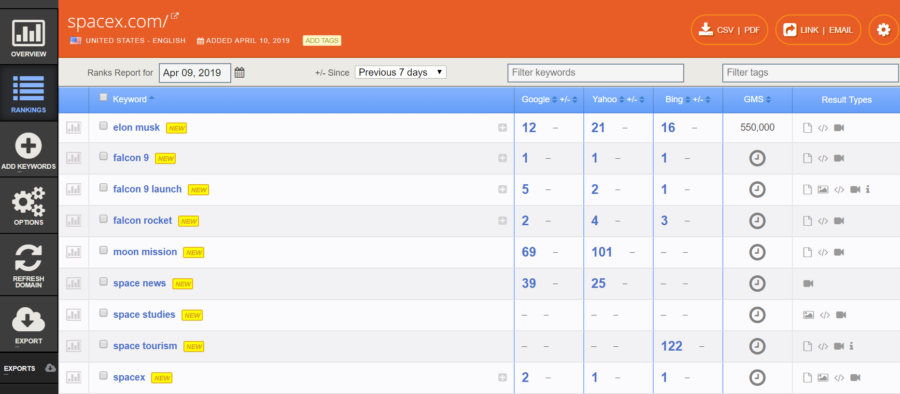
Just like AccuRanker, AuthorityLabs is standalone keyword rank tracking software, specializing in delivering the most up-to-date and accurate ranking data. The tool allows checking rankings on a daily basis as well as tracking search results on state, city, and even postal code level.
Due to AuthorityLabs’ integration with Google Analytics and Google Search Console, the tool provides you with granular data on every keyword that you track. There’s also an opportunity to see how you stack up against your competitors by comparing their rankings to yours.
Although the tool doesn’t limit the number of users, it may be a bit inconvenient that it limits the number of keywords to track – especially for those who work with big websites and data. What’s more, only the Enterprise plan doesn’t limit the number of domains you can analyze.
Pros
- Daily rank checks
- Google Analytics and Search Console integration
- Comprehensive keyword data
- Free 30-day trial
- Customer support
Cons
- Limited keywords to track
- Limited domains to analyze
Pricing
The tool’s pricing starts at $ 49/mo and ends at $ 450/mo, depending on the plan.
A free trial is available.
Learn more about AuthorityLabs’ pricing and plans.
9. SEOmonitor
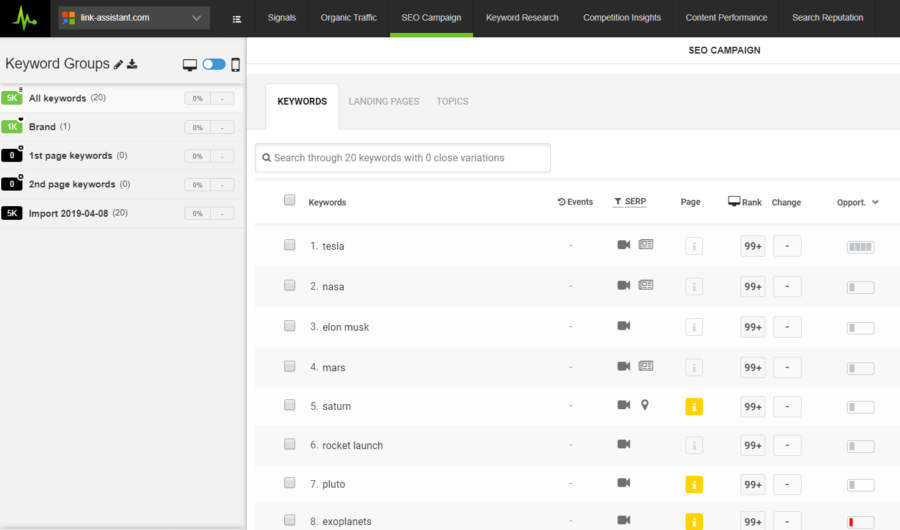
Another tool worth having in your SEO arsenal is SEOmonitor – it’s good for many different things. First and foremost, the tool performs daily checks of your website rankings both for desktop and mobile searches. The distinguishing feature of this tool is that it shows the closest variations of your target keywords for search volume data to be not duplicated with the close variants.
For you to have a full picture of your keyword list, the tool accompanies every tracked keyword with exhaustive stats – ranks, search volume, CPC, bounce rate, top 10 keyword difficulty, SERP features, and many more.
The tool also helps a lot with competition research by letting you explore and outrank your competitors by comparing your rankings to your top-5 competitors’.
The thing that I personally find extremely cool is that it can be synchronized with Slack for pushing notifications into your team’s channel. However, there’s a thing that some SEOs may dislike about the tool – it limits the number of keywords and domains.
Pros
- Google Analytics and Google Search Console integration
- Daily rank checks
- Comprehensive keyword data
- Free 14-day trial
- Customer support
Cons
- Limited keywords to track
- Limited domains to analyze
Pricing
The software’s pricing depends on the number of keywords you’re willing to check rankings for as well as on the number of domains to analyze. The price starts at €49/mo (for 1 domain and 300 keywords) and ends at €3,800/mo (for 100 domains and 100,000 keywords).
A free trial is available.
Learn more about SEOmonitor’s pricing and plans.
10. WebCEO
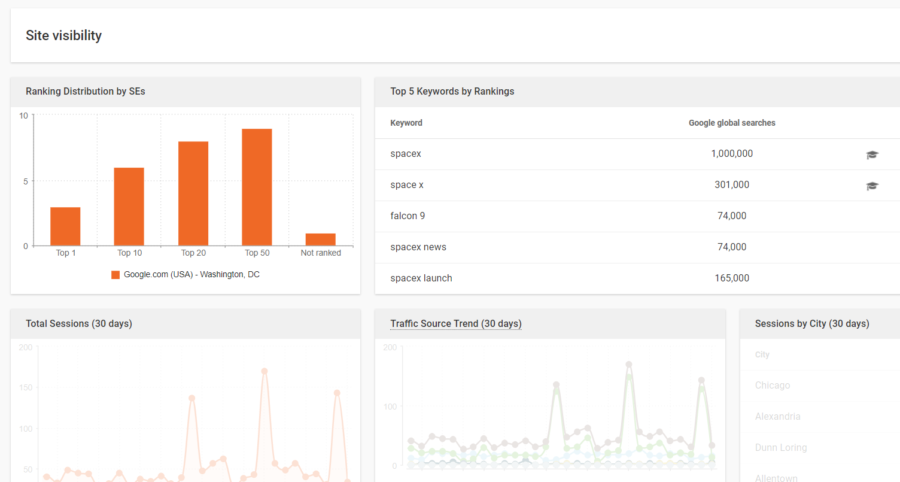
If you’re searching for a reliable rank checker, WebCEO is definitely a tool to consider. It’s a piece of all-in-one SEO software that also includes a rank tracking tool.
With the help of this tool, you’ll be able to monitor rankings on desktop and mobile devices in the widest selection of search engines, including Google, Bing, Yahoo, Baidu, Goo, Voila, Seznam, and many others. There’s also an opportunity to set your location on country and city level to see your website rankings exactly the same way your local visitors do.
WebCEO is integrated with Google Analytics, so you’ll have access to all the stats that can be fetched from there as well. See your top-10 competitors’ rankings for the keywords that you target to find the ways to beat them in SERPs.
Sadly enough, the majority of plans include only weekly ranking updates, but you can update them manually anytime. In addition to that, there’s also a limited number of keywords to track and projects to create.
Pros
- Google Analytics and Search Console integration
- Comprehensive keyword data
- Free 14-day trial
- Customer support
Cons
- Weekly ranking checks
- Limited keywords to track
- Limited projects to create
Pricing
The price of the software starts at $ 39/mo and ends at $ 299/mo, depending on the plan.
A free trial is available.
Learn more about WebCEO pricing and plans.
Final words
That’s it for our overview of 10 best rank checkers in the industry at the moment. And I’m sure that there are a lot more than just these. However, you need to make sure that the rank tracker of your choice:
- tracks positions for the number of keywords that suits your website’s needs
- updates rankings frequently enough
- provides extensive keyword data
- has a user-friendly interface
- meets your budget.
Luckily, the overwhelming majority of rank trackers these days offer free trials, so you can choose the one that best suits your needs and marketing objectives.
Digital & Social Articles on Business 2 Community
(114)
Report Post







